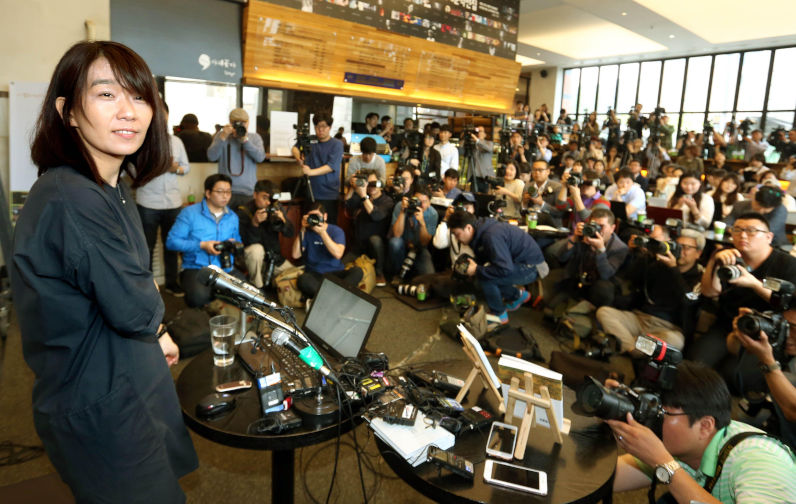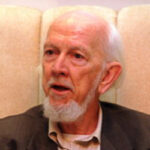Early in October 2024, the Norwegian Nobel Committee announced the award of two major prizes: the 2024 Nobel Peace Prize to the Japanese grassroots peace organisation Nihon Hidankyo (Japan Confederation of A- and H-Bomb Sufferers Organisations), and the literature prize to the Korean novelist, Han Kang. From both winners came messages addressed to our troubled times. There is little early indication that they would be heard.
- Hidankyo
The peace prize to Hidankyo was belated recognition of the struggle by surviving victims of the Hiroshima and Nagasaki bombing and subsequent Pacific nuclear testing, a struggle beginning soon after the dust settled over Hiroshima and Nagasaki in 1945 and as organised national and international movement from the founding of Hidankyo in 1965.
Probably no one would dispute that Hidankyo’s Nobel Peace prize award is well deserved, but it comes very late. For roughly eight decades from 1945, the testimony of Japanese and Pacific nuclear victims spearheaded the demand that nuclear weapons be abolished. As of 2024 it has still to bear fruit.
In the 21st century, the ranks of hibakusha survivors shrink steadily. The youngest are now in their 80s. The award to the Hidankyo organisation of atomic bomb survivors in 2024 was the fourth time the Nobel Committee has recognised the work of anti-nuclear organisations, following Physicians for the Prevention of Nuclear War (1985), the Pugwash Conferences (1995), and ICAN, the International Campaign to Abolish Nuclear Weapons (2017). However prestigious and many the prizes and however worthy the cause, however, human civilisation remains precariously tethered to the existence of nuclear weapons.
And yet, as is well-known, nuclear weapons exist, stockpiled in the hundreds or thousands by nine countries (the five “Great Powers” of the Security Council headed by US with an arsenal of some 5,000 weapons, followed by Russia, United Kingdom, France, and China, together with the aspiring powers of India, Pakistan, Israel, and North Korea. All these countries – with the exception of North Korea that exited the Treaty in 2003 – are obliged under the Nuclear Non-Proliferation Treaty of 1968 to abolish them. Yet all ignore such obligation. Likewise, the global movement for a total and permanent nuclear weapons ban under the Nuclear Weapons Ban Treaty (TPNW) of 2017 remains stalled. As of September 2024, 73 countries had ratified or acceded to it but their number did not include any of the existing nuclear states, or other important states such as Australia and Japan for whom “security” rests on the “extended deterrent” provided by the US nuclear weapons, the so-called “umbrella.”
Almost simultaneously with the announcements of the two Nobel prize awards came news of a new government in Japan, headed by veteran conservative (LDP) figure, Ishiba Shigeru. Ishiba, sometimes seen as a liberal for his progressive stance on matters such as same sex marriage, is nevertheless a long-tern member of major right-wing (emperor-focused) organisations such as Nihon Kaigi and the Shinto Politics League and, both before and after taking office as Prime Minister, he made clear his support for the Abe Shinzo government (2012-2020) policies of doubling defence expenditure, militarising the China-fronting South-Western Islands, and further entrenching the US military presence in its Japan bases. Once in office, Ishiba repeated his support for an (East) Asian NATO. Since NATO itself is nothing but a nuclear treaty, it was clear that Ishiba’s government, committed to establishing a joint US-Japan nuclear alliance on NATO lines and extending it in due course to Australia, the Philippines and potentially other states, would be turning a deaf ear to any Hidankyo anti-nuclear appeal.
The Norwegian Nobel Committee head noted darkly,
“the taboo against the use of nuclear weapons is under pressure. The nuclear powers are modernising and upgrading their arsenals; new countries appear to be preparing to acquire nuclear weapons; and threats are being made to use nuclear weapons in ongoing warfare.”
Masako Wada, Nagasaki survivor and representative of Nihon Hidankyo, said,
“The world is currently moving backward on nuclear disarmament. The Russian invasion of Ukraine has caused unspeakable human suffering and raised the risk of nuclear war. I have dedicated my life to nuclear abolition. I feel how sinful humans are. Rather than anger, I feel sorrow, and fear how deep humans will fall into the darkness. We have to keep going forward to convey our wish, our hope to reject nuclear weapons. That’s our mission as Hibakusha.”
2. Han Kang
The Nobel literature prize for 2024 went to the 53-year-old Korean woman novelist and poet, Han Kang, In a series of major works published first in Korean and then translated into other languages including English ― The Vegetarian (2007), Human Acts (2014) and We Do Not Part (2021) ― she probed some of the little-known horrors of the 20th century, from the brutal, probably genocidal, repression meted out to the people of Cheju Island protesting the 1948 UN decision to divide Korea into separate states of South and North through to the 1980 crushing of the democratic uprising in Gwangju City. Through the mid to late 20th century atrocity followed atrocity in Korea, with roughly one in five of Cheju Island’s population slaughtered in the 1940s and hundreds, perhaps thousands, more civilians in Gwangju in 1980. The atrocities in both cases were committed by South Korean and American (United Nations) forces.
The Nobel Committee praised Han’s “intense poetic prose that confronts historical traumas and exposes the fragility of human life.” Her best-known ― and best-selling ― works, described by Korean critics as “witness literature” and a “trilogy of suffering,” probe the multiple horrors of Korea’s 20th century. The 21st century reader may be shocked to be introduced to a Korea as a 20th century “Gaza,” but the term is surely appropriate. Critic K.J. Noh introduces her writing as “a cry for Palestine.” (Consortium News and Pearls and Irritations 16 October 2024.)
Asked how she would celebrate her Nobel recognition, Han responded that celebration was out of the question so long as genocide raged, killing in Gaza and Ukraine went unchecked and division and inequality prevailed,
“To find hope amid such darkness,” she told a Japanese Asahi shimbun interviewer in May 2024, seems “almost impossible.” “But ,” she went on,
“so long as humanity lives, we cannot help but hope. Hope and literature have in common that they require a tenacious effort of the imagination. Dealing with historical events means somehow finding a way to narrate the past while addressing the present.
To fix our gaze firmly onto history, questioning it, is also really to question human nature. I am always drawn by the way humanity can embrace the past while moving forward towards new life.”
By her writing Han strives for precisely the “impossible;” to communicate the incommunicable.
3. Messages sent
Sweden’s Nobel Committee thus sends a dual message to the world, on the one hand calling for attention to be paid to the Hidankyo cause of nuclear disarmament, and on the other to share Han Kang’s unflinching focus on the horrors of state violence, exposing and remembering it and mourning its victims.
In Australia, neither Hidankyo nor Han Kang is well-known, but both deserve to be. Our peace and security is more likely to be guaranteed by our forging of a thick mesh of civic, peace, anti-nuclear, democratic values and organisations than by the war games and weapons systems on which increasingly our government seems bent.
Gavan McCormack is emeritus professor of Australian National University, editor of the Asia-Pacific journal Japan Focus and author of many works on modern Japan and East Asia, which are commonly translated and published also in Japanese, Chinese, and Korean.

